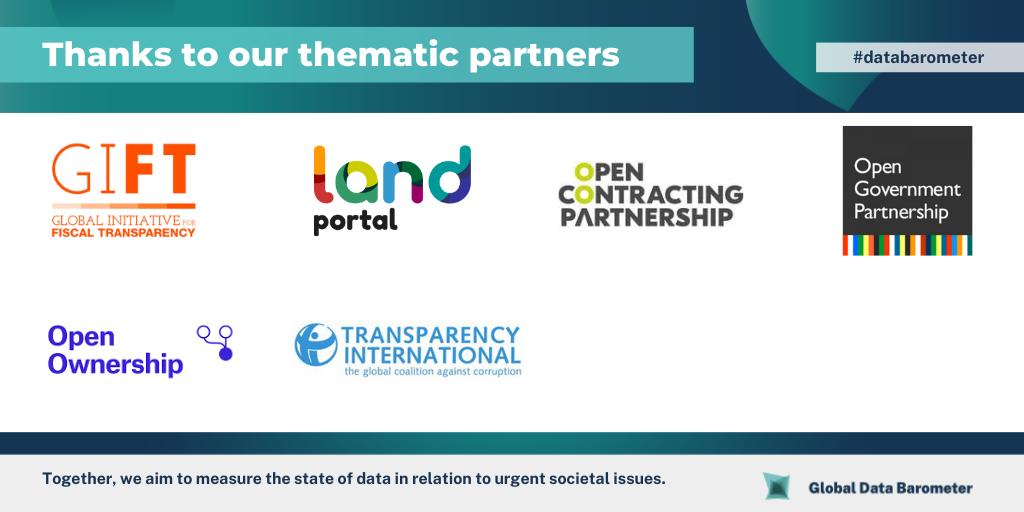Launch of the Global Data Barometer 2022

Open Ownership worked with the Global Data Barometer team to design the question set for the company information module of the Global Data Barometer. Here Louise Russell-Prywata and Tymon Kiepe answer questions about current trends, and what we can look forward to in the future, if we are to achieve a world where there is "nowhere to hide".
Context
Why is company information important? How does it relate to data for public good?
Beneficial ownership is widely recognised as an essential piece of information for tackling corruption, preventing and investigating tax evasion, protecting national security, and creating sustainable trading environments. The goal – increasingly shared by governments, businesses, and citizens – is that people can access accurate and high-quality information on the true owners of companies, and effectively use this to increase the accountability of companies and governments to citizens, and reduce known risks such as corruption and tax evasion.
Momentum for transparency of company ownership has been rising since the first open beneficial ownership registers were launched around 2015-2016, and over the past two years the public focus on this has further accelerated due to:
- COVID-19: the pandemic has highlighted role of beneficial ownership transparency in ensuring accountability of government spending in response to the virus, leading to a substantial increase in interest in using beneficial ownership data to identify the individuals behind companies that hold contract with governments
- Invasion of Ukraine: Russia’s invasion of Ukraine led to several countries quickly seeking to impose sanctions, and highlighted the need to know the identify of beneficial owners of companies in order to effectively sanction individuals and more broadly for governments to understand who operates in their country’s financial system
To date, over 110 countries have committed to centrally collecting and publicly publishing data on the beneficial ownership of companies that operate in one or more sectors of the economy (for example, extractives). However, implementation of public beneficial ownership registers lags behind, with many countries not yet having live registers. Where countries do have public beneficial ownership registers, there are commonly barriers to accessing and using the data. These factors are preventing beneficial ownership transparency from achieving its full impact.
At its most impactful, open company ownership data can:
- Tackle corruption and criminal activities by making it more difficult to use companies to hide the proceeds of crime, and helping to identify and recover stolen assets
- Support sustainable economies and build market confidence by helping businesses understand who they are doing business with, supporting effective due diligence and risk management
- Run effective tax systems by helping combat tax evasion
- Improving public spending by fighting corruption and fraud in public procurement
- Improve trust in government by increasing accountability and public oversight of government spending
Making data available to the public increases the range of people and organisations that can use beneficial ownership data to support the benefits outlined above. Publishing as open data maximises its usability and decreases the cost of using data.
Data
What are the main trends in terms of the Global Data Barometer data in your area of work? What are the main highlights? What are the main obstacles in the data field in your area of work?
Main findings
Many countries have legal frameworks for collecting data, but there’s a big implementation gap
Most surveyed countries have provisions for the collection of beneficial ownership data, however, data is only publicly available in a minority of countries. Many countries have legal frameworks in place for the collection of beneficial ownership data, and sometimes also its publication, but at the time of the research had not yet implemented these to create a live beneficial ownership register. This finding is in line with Open Ownership’s own analysis and experience that there is a substantial implementation gap for beneficial ownership reforms.
Valuable information on how beneficial ownership is held isn’t often available in the data
For countries where beneficial ownership data is publicly available, there is a tendency for countries to not include information about how beneficial ownership is held (for example, where ownership is held through a chain of different companies, information on this ownership chain is not often published). This information is known to be important to several uses of beneficial ownership data, and it will be interesting to track this indicator in future iterations of the Barometer to understand whether more countries start to provide this information.
Even where data isn’t made available by government, people are finding creative ways of creating and making use of ownership data
The data has also shown some new and creative ways of generating and using company ownership data, including beneficial ownership, where it is not made available through centralised government registries. For example, in China although the research finds that there is no open data on company registration widely available, the research notes that there are at least three well-known applications that scrape company data from official government websites, clean it and use it within applications providing services that are used by the media and CSOs.
Challenges and lessons learned for future research
There is still some confusion between legal ownership and beneficial ownership
Because some countries inevitably collect and publish some beneficial ownership information as part of basic company information, it is not always easy to quickly identify where beneficial ownership information is being explicitly collected.
What we learned from the data review process there is still confusion around the concept of beneficial ownership and how this differs from legal ownership. In some cases a person can be both the legal owner of a company and its beneficial owner, for example if they are a shareholder. However, in more complex ownership structures, the legal owner may be a company or other legal entity, with the beneficial owner a different person. It is exactly these more complex structures that are of primary interest for tackling corruption, economic crime and tax evasion.
Therefore, when states don’t explicitly collect beneficial ownership data all of these structures are beyond scope. However, some country researchers have recorded the presence of legal ownership data that includes some beneficial owners as beneficial ownership data being available. This has led to some countries such as Italy and Korea, which publish comprehensive legal ownership data, scoring more highly on beneficial ownership than we would expect, given they have not implemented registers of beneficial ownership. There are lessons here for the methodology for next time.
Some good scores exist for availability of data even where it is not public
Of the countries that do not publish the beneficial ownership data that they collect, the Barometer has shown some interesting findings about data that is held. Some countries publish a lot of information about their non-public data. Where this has happened, some countries have scored well on certain aspects of their data (e.g. structured, available by API), although this data is not open and only available internally. This, although perhaps outside the original intention of the questions on data availability as measures of public access to data, are interesting and can be seen as encouraging and showing a focus on promoting use of beneficial ownership data by authorities even where it is not publicly available.
The biggest survey of beneficial ownership to date
Overall, the corporate ownership module data is an incredibly rich repository of information on the state of beneficial ownership reforms around the world. From Open Ownership’s perspective, its key value lies in this, and in the ability to track changes and trends within countries and globally over time, rather than in making absolute comparisons between countries included in this dataset. An assessment of the implementation of BOT reforms at this scale is unprecedented, and we are looking forward to continuing our work with GDB to improve data collection and see trends over time.
What's next?
What are your recommendations to improve the data field in your area of work, and what can we expect in the near future?
In order to improve the quality of data available and close the implementation gap, Open Ownership will continue to assist countries to implement BOT according to the OO Principles, which draw on best practices in open data.
We also plan to use the GDB dataset for certain countries to gain a deeper understanding of what is required to improve implementation and raise global standards. For example, we will be analysing the data from G20 countries to create an up to date snapshot of implementation across this group and provide evidence to support recommendations for advancing beneficial ownership transparency through the G20.
Where more open BO data becomes available we will be ingesting it into the Open Ownership register. It is currently ingesting data from 4 jurisdictions, with more to come soon.
For jurisdictions that are publish data using the Beneficial Ownership Data Standard, data can readily be ingested and integrated with other data on the OO register to understand and visualise transnational ownership structures.

